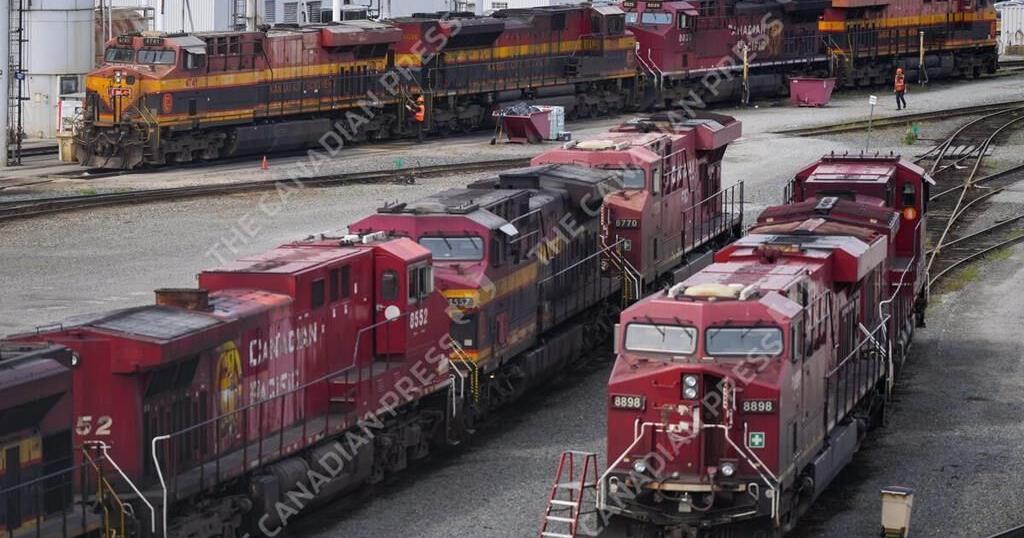MONTREAL – A looming work stoppage at Canada’s two biggest railways could have widespread effects on everything from daily commutes to the movement of grain and fuel.
Unless deals are reached, rail service at both Canadian National Railway Co. and Canadian Pacific Kansas City Ltd. could grind to a halt at 12:01 a.m. EDT Thursday, in what’s been described as an unprecedented simultaneous work stoppage at the country’s biggest rail companies.
Here are some of the potential effects:
Commuters
Transit authorities say select commuter lines that run on CPKC tracks in Toronto, Montreal and Vancouver will be suspended should dispatchers and other workers walk off the job, leaving some 32,000 commuters to find other routes to the office.
About 21,000 of them are in the Montreal area, where the Exo network is asking customers on the Candiac, Saint-Jérôme and Vaudreuil/Hudson lines to look for alternative transport.
Other commuter lines affected by the potential work stoppage are TransLink’s West Coast Express in the Vancouver area, Metrolinx’s Milton line and the Lakeshore line’s Hamilton GO station in the Greater Toronto Area.
Ports
If left without a way to keep cargo moving out by rail, Canadian ports can expect backlogs and slowdowns as containers pile up.
The Port of Vancouver — where two-thirds of the cargo arrives or leaves by rail — said it expects disruptions to the movements of grain, potash, coal and other goods. The port said this week that it expects increased traffic at anchorages at the Port of Vancouver and around the Southern Gulf Islands, and has asked ships en route to Vancouver to slow down in order to limit congestion.
The Montreal Port Authority says it intends to redouble its efforts to allow more trucks to use its terminals in the case of a work stoppage, but spokeswoman Mélanie Nadeau said that certain markets served from Montreal would face major challenges, notably Ontario.
Retail
The Retail Council of Canada says the country’s biggest brands often bring product into the country from Asia and Europe via ports in Montreal and Vancouver. The strikes stand to stop the flow of merchandise and consumer goods spanning from food to apparel, furniture and even electronics, the council’s spokeswoman Michelle Wasylyshen said.
The Canadian Federation of Independent Business has also warned that any disruptions to railway operations could be “devastating” for small businesses who rely on rail services to send and receive goods, and who may lose sales and contracts if items are not delivered or received on time.
Commodities
The two rail companies involved in the contract dispute move roughly $1 billion worth of goods per day, ranging from wheat to timber, oil and consumer products, according to the Railway Association of Canada.
Some 315.7 million tonnes of commodities were moved by rail in 2022, including 20.9 tonnes of wheat, 6.9 million tonnes of canola, 48.6 million tonnes of coal and 18.2 million tonnes of iron ores and concentrates, Statistics Canada reported. Potash, fertilizer, lumber, and construction materials such as sand, gravel, stones and crushed stone are other big movers.
Wade Sobkowich, who heads the Western Grain Elevator Association, said there is “no Plan B” to replace the 6,500 railcars that carry bulk grain across the country.
Rail companies already started refusing perishable grocery store items like meat, French fries and bananas in anticipation of a possible strike, said Michael Graydon, CEO of Food, Health and Consumer Products of Canada.
International affects
Railways and business groups in the United States are also warning of the potential consequences of a work stoppage. The U.S. and Canadian chambers of commerce issued a joint statement urging the Canadian government to intervene.
“Significant two-way trade and deeply integrated supply chains between Canada and the United States mean that any significant rail disruption will jeopardize the livelihoods of workers across multiple industries on both sides of the border,” they wrote.
The U.S.-based CSX and Norfolk Southern railways have closed their gates to most cross-border shipments, while shipping giants such as Hapag-Lloyd have made “contingency plans” as others reroute cargo.
— With files from Tara Deschamps in Toronto, Christopher Reynolds in Montreal and Jeremy Simes in Regina.
This report by The Canadian Press was first published Aug. 21, 2024.

























